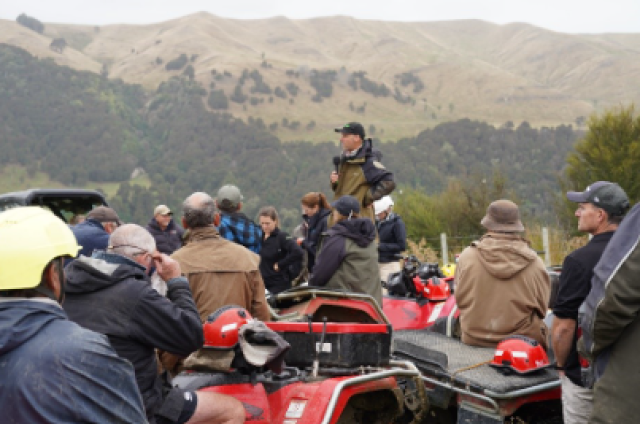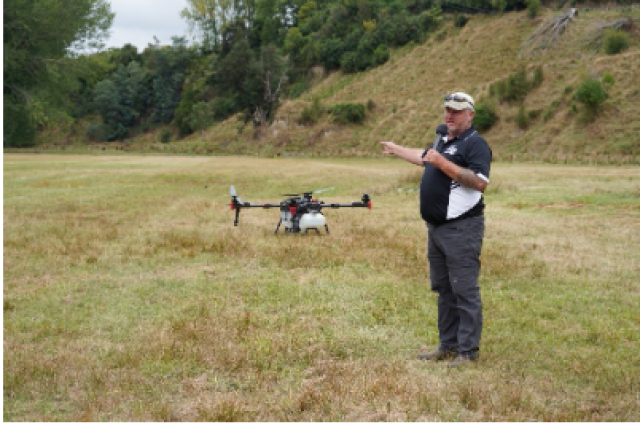The B+LNZ Manawatū Farming for Profit field day, recently held at Ngāputahi Station, brough together over 110 farmers to discuss being change-makers rather than change-takers. View key insights from the day.

Ngāputahi Station is a 1,995 ha sheep and cattle stud farm near Ashhurst, owned by Forbes, Christine and Angus Cameron and Nadya Craig. Renowned for their hard-nosed approach to breeding and genetics, the Camerons are highly sought after for their rams and bulls. They are also previous winners of the Glammies and the Steak of Origin.
The B+LNZ Manawatū F4P field day kicked off with a panel discussion featuring Ngāputahi Station’s Forbes Cameron, local farmer Sam Brown, B+LNZ Wormwise Programme Manager Ginny Dodunski, and Agronomist Eddie Walker. Discussions delved into various aspects of farming, covering animal health, nutrient management, crops, and pasture management.
Key takeaways from the panel discussion
Surround yourself with diverse opinions
Local farmer Sam Brown shared a valuable insight into his on-farm decision-making. He highlighted the importance of seeking out a diverse range of opinions so that you are not surrounded with trusted advisors that “all just agree with each other”.
By actively seeking out differing perspectives and challenging your thinking, Sam explained, you can foster innovation and make more informed decisions that benefit the farm.
The importance of planning
One of Ginny’s golden nuggets of advice for winter and spring parasite management was the importance of early planning and preparation. She said, "winter starts on the first of February”.
“Feed cover at the beginning of winter is a key driver of how well ewes can be fed in late pregnancy and early lactation, and planning for this starts in summer.
“Well-conditioned ewes, lambing onto good grass covers that are growing to meet demand, do not require drenching.
“Well-fed ewes wean bigger lambs that can be sold faster, reducing total drench inputs into the system. Replacement lambs have much lower winter drench requirements if they hit winter at high bodyweights,” she explains.
Identify, identify, identify
Forbes highlighted the importance of genetic selection, rephrasing the popular saying "location, location, location" to “identify, identify, identify” highlighting that the biggest opportunity to lift performance from within a ewe flock is to identify the poorer performing ewes and either mate them to a terminal sire or get them out of the system altogether.
Ewes that wean in light condition may have reared two great lambs, or they may be poor ewes. Forbes’ advice is to separate them at weaning and if they do not pick up after 4-6 weeks of good feeding, they should be permanently identified and not be used for breeding replacements. He says, “don’t drench them and forgive them”.
Good foundations crucial
Although the theme was about embracing change, a key message highlighted throughout the panel discussion was to get foundations right first and built on those.
All panellists agreed that while It’s easy to look for ‘silver bullets’, the fundamentals of good feeding and pasture management must be taken care of first.
“You will often get the biggest sustained lifts in performance by focussing on these as opposed to trying a new enterprise or a different crop – deficiencies in management will limit the success of anything new if the fundamentals aren’t right to start with,” added Ginny.
Farm tour: insights into breeding practices
Following the panel discussion, attendees went on a farm tour led by the Camerons. They shared insights into their acclaimed breeding practices, renowned for producing prize-winning rams and bulls.

Advancements in drone technology
Attendees witnessed a drone demonstration by Brandon Day from local startup Ram Drones. Brandon showcased the latest advancements in drone technology and how these drones can help in seeding and spraying applications across diverse terrain, particularly on challenging hill country landscapes.

The day was capped off the day with a networking BBQ.
About B+LNZ’s Farming for Profit (F4P) programme
The Farming for Profit (F4P) programme is B+LNZ’s signature extension programme designed to address the current priorities and issues faced by the local farming communities from a farm systems perspective.
The programme offers a mix of on farm and off farm events, with a maximum of three events each year.
Learn more on B+LNZ’s website here.